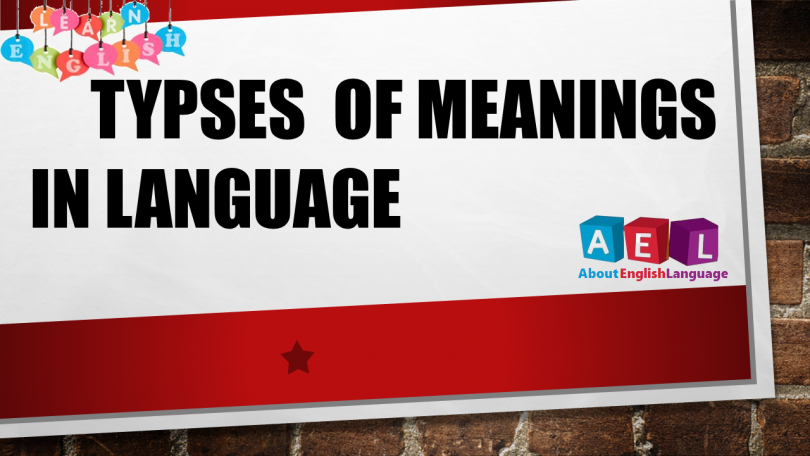Types Of Meanings
Meaning is a very important aspect of any language. It is the convention that has been recognized and accepted by the speakers of a particular language. The word which shows certain information of an object which has been recognized and accepted, for the corresponding object to be continued for long. Frankly speaking, we can say that meaning of anything which exists in this world is arbitrary. The meaning is anything that is used to represent a particular thing. For example, we see a “Book” on the tablet and we deduce the meaning of a book as ” collection of information”, “collection of printed pages with information on it”, or we can say ” a source of knowledge”. So, all three are the meanings of the word ‘Book”.
Importance of meaning
Meanings are very important to convey the message we want to convey and for the reader and listener to interpret. Meanings can be social or literal which we will discuss later on. If we want to say something to our friend, we will use the words which are already existing in our language and we have extracted a specific meaning out of them. So, for understanding the context or entire conversation one has to be familiar with the meaning of that particular language.
Types of meanings in language
There are mainly 7 types of meanings in language namely:
- Conceptual meaning
- Connotative meaning
- Social meaning
- Affective meaning
- Reflected meaning
- Thematic meaning
Conceptual meaning
Conceptual meaning is the dictionary meaning of any word. It is that type of meaning which has been recognized and accepted by the whole world. It has the same meaning throughout the world. Conceptual meanings are very important for understanding the context of the talk.
For Example:
- The word “Gutted” has meaning of “sorrow state” and “sadness”.
- The word “happy” has the meaning of “joy” and “euphoric”.
- So, conceptual meanings are the dictionary meanings of any word.
Connotative meaning
Connotative meanings are the meanings that we as a society have attached to a word. Connotation is something that is related to the person itself. Every person has their own connotation of a word. It differs from person to person and society to society.
For example:
If you have ever come across a dog where he chased you and you got hit by the pole and got injured what connotation you will have about the dog? Obviously, negative connotations. So, your connotation about dogs will be “negative” and,”injury”. But a person, who loves dogs, will have a connotation like “amiable”, “loyal”, and ‘caretaker”.
So, the connotation of any word is related to every individual. It doesn’t remain the same for every individual. It is related to incidents that happened to you or your experience with that particular thing or word.
Affective meaning
Affective meaning is related to the attitude of the speaker toward the listener or about what context of the talk is.
Let’s understand it through examples
- Wow, you broke my glass!
- wow, you have won the medal.
- In sentence 1, the speaker has a harsh attitude toward the listener. While, in sentence 2, the speaker is accolading the listener.
Reflective meaning
Words that have double meanings and they mean different when used differently. These kinds of words are ambiguous and they create confusion in understanding the meaning. But meaning can be understood through the context of the talk.
For example
I like bats.
Here, we don’t know which ” bat ” the speaker is talking about. Either he is talking about the cricket bat or bat which belongs to the category of bird.
The bank is overcrowded.
It means that there are so many people at/in the bank. Is he talking about a bank which is a financial institution or the edge of the river? So, it is ambiguous as the word reflects two meanings.
Social meaning
Social meaning is the meaning of anything which has the same meaning but different words are used to describe it in different parts of the world.
For example:
the word “Husband”, is also known as “Shohar”, “hubby”, “man”, or “Munna k Abba”. So, social meanings depend on the class or educational background of the people.
Collocative meaning
Collocative meanings are the words that always come together and complete the meaning. They don’t have the meaning when used differently.
For example:
We use the term, “a beautiful girl”, and “a handsome boy”.
So, here are examples of collocation in English. If we use beautifully with the boy then it would be incorrect and if we use handsome with a girl it would also be incorrect. So, collocation is the words that often come together to complete the meanings.
Thematic meaning
Thematic meanings can be created by changing the structure of the sentence. By changing the structure, we change the emphasis we put on the sentence and so its meaning is changed.
For example:
- I put the keys on the table.
- On the table, I put the keys.
- Here in sentence 1, the focus is on keys while in sentence 2 the focus is on the table.





